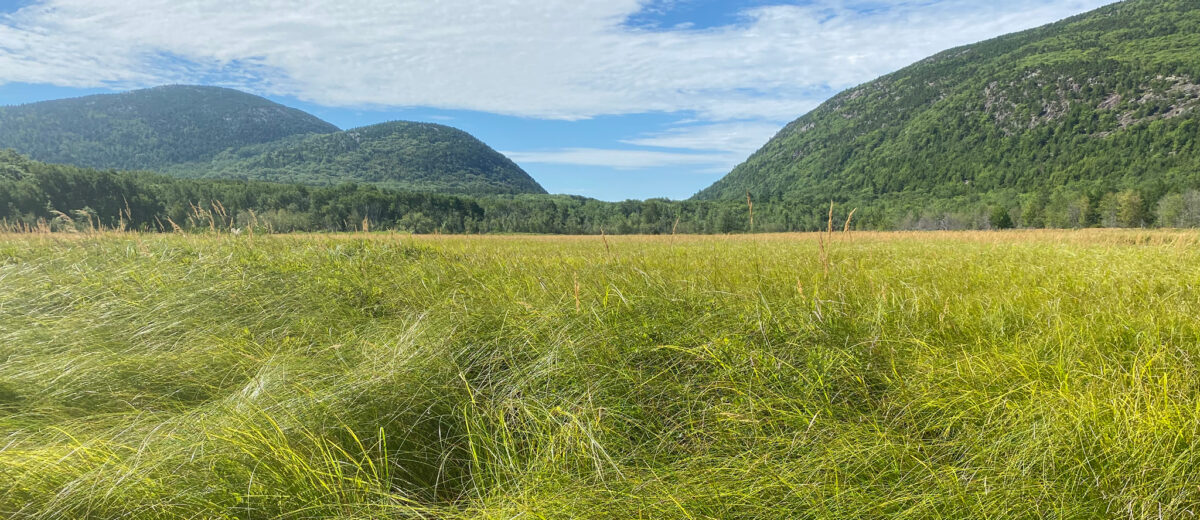from Acadia National Park
The National Park Service (NPS) encourages public comment on an Environmental Assessment (EA) about a proposal to improve the ecological health of the Great Meadow in Bar Harbor, Maine, by restoring natural function to the wetland and Cromwell Brook. The Great Meadow Restoration Project proposes to:
- restore wetland ecosystem function,
- improve wildlife passage and connectivity along Cromwell Brook,
- improve downstream channel morphology,
- build resiliency and ecological adaptability to the ecosystem,
- enhance the recreational experience for visitors, and
- reduce damage and maintenance to infrastructure and facilities.
The park prepared the EA to evaluate potential impacts and determine if the park should change restoration practices. The EA examines two alternatives. In Alternative A (no action), park would continue to enforce the existing management conditions, visitor access, and visitor use at Great Meadow and the surrounding project area. Alternative B (proposed action) would allow for:
- Replacing the Park Loop Road culvert at the outflow of the Great Meadow with a larger crossing that has a more natural stream design;
- Rehabilitating the Great Meadow Loop community connector trails by developing missing segments to meet accessibility standards, rerouting them to connect with the Great Meadow vista, improving wayfinding, and adding educational waysides;
- Implementing targeted restoration projects to return natural function to the 116-acre wetland;
- Restoring the Cromwell Brook stream channel and constructing a grade control weir at the transition from the Great Meadow to the stream channel to mitigate high flow flood events; and
- Expanded invasive plant management and restoration with native plantings.
Additional proposal details include:
- In the early 20th century, early site stewards manipulated the Great Meadow and Sieur de Monts Springs areas to allow for the construction of roads, trails, and buildings. Scientific monitoring of this area suggests that these changes to the landscape negatively affected the wetland’s function.
- The no action alternative would add a substantial adverse impact on vegetation, wildlife, and cultural landscapes within the wetland.
- The proposed action promotes ecological resilience and reduces long-term operating and maintenance costs to historic properties.
The proposal addresses the following park issues:
- Trail improvements would remove pedestrians from vehicle travel lanes. This is key to visitor safety, especially as visitation continues to increase.
- With a reduction in flooding and thus a reduction in the need for emergency repairs along trails and roads, park staff can devote their time to other preservation needs.
- Nonnative plants pose a significant threat to natural resources throughout the park. By expanding invasive species mitigation and increasing the planting of native plants, the park will improve the health of the Great Meadow wetland.
If this proposal is approved, the benefits to NPS staff, partners and visitors would include:
- Improved access to trails surrounding the Great Meadow
- More opportunities for visitor education throughout the restoration site
- Reduced flooding throughout the proposed project area
Comments must be received by May 23, 2023, 11:59 p.m. Mountain Time. Comments may be submitted online at: https://parkplanning.nps.gov/GreatMeadow or by mail. Mail comments to:
Superintendent
Acadia National Park
Attn: Great Meadow Restoration Project EA Comments
PO Box 177 Bar Harbor, ME, 04609
Following the comment period, the park will make a final decision about the proposal. A final decision is expected in late Spring.
Public Comment Considerations
- Comments will not be accepted by fax, email, or by any other means.
- Bulk comments in any format submitted on behalf of others will not be accepted.
- Before including your address, phone number, email or other personal information, be aware that your entire comment – including your personally identifiable information – may be made public at any time. You may ask us to withhold your personally identifiable information from public review, but we cannot guarantee that we will be able to do so.
- The proposed project is an undertaking as outlined under Section 106 of the National Historic Preservation Act (NHPA). We welcome comments about historic properties or other cultural resources that fall within the project area.
In addition to NHPA, the park is also completing compliance that includes the Endangered Species Act, and other applicable laws and policies for this project.
